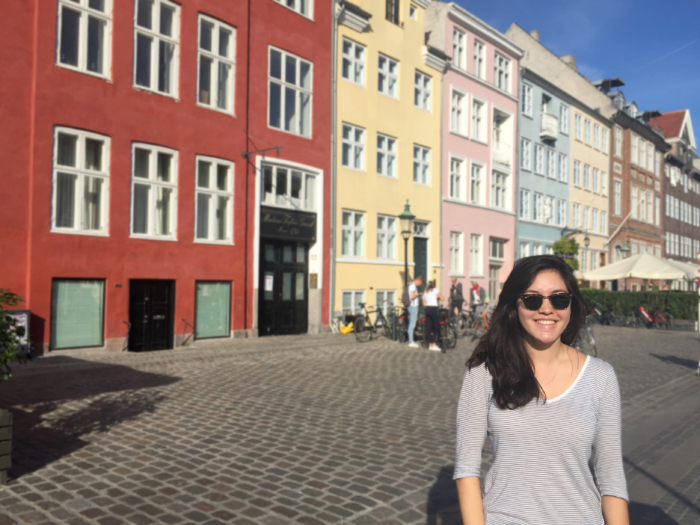
Biology major Siria Medina ’18 wanted to spend the summer abroad in the hopes that it would help her pursue a Fulbright Fellowship during her senior year. After sending email inquiries to several European laboratories, Medina landed an internship at one of her top choices: Rigshospitalet’s Neurobiology Research Unit in Copenhagen, Denmark. Not only does this large, highly specialized hospital study neurobiology, a field she is greatly interested in, but Medina also says its dual clinical and research facilities are important for her desire to pursue a medical profession.
In the lab, Medina assists two graduate students and a postdoctorate in studying “behavioral changes based on drug administration.” Nearly a month into her five-week internship, she’s contributed to two research projects: an experiment that involved giving rat subjects a type of amphetamine, Clozapine N-oxide, and studying its effects on their locomotive capabilities; Medina also conducted PET and MRI scans of the rats to map the activity of dopamine in their brains and its potential effects on behavior.
Her day-to-day tasks vary, and Medina values the opportunity to learn how to use the different types of brain scanning equipment and specialized data analysis programs. Although Medina was introduced to these topics in a Scripps course that covered neurological disorders and how drugs affect the brain and body, participating in the research and seeing the work in practice has been an exciting experience, she says.
“Up to this point, I’ve learned in theory, in my neurology classes, what these scans are and what these machines do, but I haven’t actually used a PET scanner or MRI machine,” Medina says. “Just making that connection between classes and lab is awesome to see.”
She expects this hands-on opportunity will also help her in the upper-level science course she will take in the near future. Medina further credits her internship with providing her a better understanding of how to approach data analysis and design projects, as well as how to consider the feasibility of experiments, including what can realistically be accomplished within a certain timeframe and budget.
At Rigshospitalet, Medina has met other students from around the world, while making the most of her international experience outside of lab. She has explored Copenhagen’s famous art and architecture, visited Tivoli Gardens, and toured the Kronborg Castle in Helsingør, the setting of Shakespeare’s Hamlet. To add to her sense of adventure—and the admitted lack of an international cellphone plan—Medina is navigating the city mostly without the convenience of GPS.
“I think getting lost is half the fun. You can see different places,” she says. “I’m not discouraged from going out. It’s nice living here long enough that I feel more like a local, not just a tourist.”

